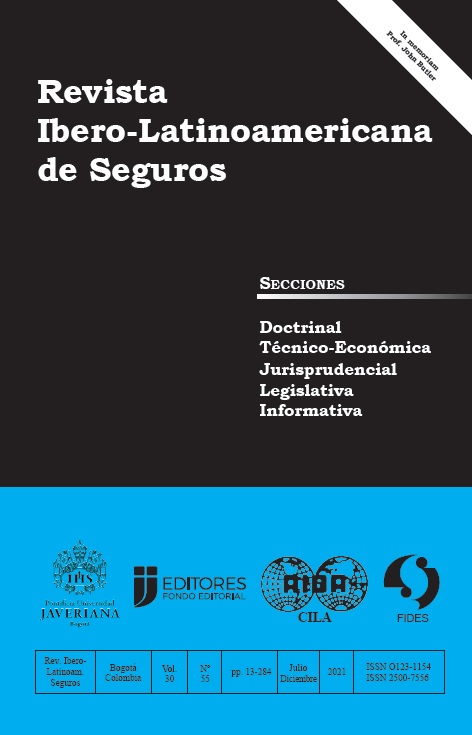Resumo
El 23 de noviembre del año 2020, la Sala Civil de la Corte Suprema de Justicia falló un recurso extraordinario de casación interpuesto por una empresa transportadora,[1] en contra de la sentencia de segunda instancia proferida por el Tribunal Superior de Distrito Judicial de Bogotá. En dicho proceso judicial, se discutía si las exclusiones del contrato de seguro, para ser alegadas por la aseguradora, debían ser la causa adecuada del siniestro.
Con el fin de dar más contexto sobre el caso, anticipamos que la parte demandante, amparándose en la posición de un sector de la doctrina, con precursores como el maestro J. Efrén Ossa Gómez, sostuvo a lo largo del proceso que las exclusiones legales o convencionales debían aplicarse con un criterio causal para ser invocadas como eximentes de responsabilidad del asegurador.
Por su parte, la aseguradora demandada sostenía que las exclusiones no sólo podían ser aplicadas con un criterio causal sino, también, de acuerdo con otras circunstancias técnicas del contrato de seguro, así las mismas no fueran la causa adecuada del siniestro, en virtud de la posibilidad de delimitar el riesgo asegurado establecido en el artículo 1056 del Código de Comercio.
La Corte Suprema de Justicia apoyó la postura de la aseguradora y, apartándose de la posición clásica de reputados autores, adoptó un criterio novedoso al considerar que, por las amplias facultades que tiene la aseguradora para delimitar el riesgo asegurado, basta con que la exclusión tenga una explicación técnica ―aunque no sea la causa adecuada del siniestro― para prosperar, siempre que la misma tenga relación con los hechos o condiciones que antecedieron la ocurrencia del siniestro.
[1] M.P. Francisco Ternera Barrios, ref: SC4527-2020.
A. Doctrina
Garrigues, J. (1982). Contrato de Seguro Terrestre. Editorial Aguirre.
Halperin, I. (1972). Seguros. Exposición crítica de la Ley 17.418. Editorial Depalma.
Jaramilllo, C,I. (2012). Derecho de Seguros. Editorial Temis y Pontificia Universidad Javeriana.
Josserand, L. (1951). Derecho civil. Tomo II. Vol. II. Contratos. Ediciones Bosch.
Ossa, J, E. (1991). Teoría general del seguro: el contrato. Editorial Temis.
Sánchez, F. (1999). Ley de Contrato de Seguro. Comentarios a la Ley 50 de 1980, de 8 de octubre y sus modificaciones. Editorial Aranzadi.
Stiglitz, R. (2004). Derecho de Seguros. Editorial. La Ley.
Stiglitz, R. (2008). Derecho de Seguros, Tomo I, 3ra Edición actualizada y ampliada. Editorial La Ley.
Veiga, A,B. (2010). Caracteres y elementos del contrato de seguro. Póliza y clausulado. Editorial. Biblioteca Jurídica Diké y Universidad Sergio Arboleda.
Veiga, A,B. (2005). Condiciones en el contrato de seguro. Editorial. Comares.
B. Jurisprudencia
Corte Suprema de Justicia, Sala Civil, 23 de noviembre de 2020, RAD: 11001-31-03-019-2011-00361-01 MP Francisco Ternera Barrios.
Corte Suprema de Justicia, Sala Civil, 19 de noviembre de 2001, REF: 5978, MP Jorge Antonio Castillo Rugeles.
Corte Suprema de Justicia, Sala Civil, 26 de enero de 1998, REF: 4894, MP Carlos Esteban Jaramillo Schloss.
Corte Suprema de Justicia, Sala Civil, 4 de abril de 1997, GACETA JUDICIAL: CXVII
Corte Suprema de Justicia. Sala Civil, 7 de octubre de 1985, GACETA JUDICIAL: CLVIII
Corte Suprema de Justicia. Sala Civil y Agraria. 13 de mayo de 2008. RAD: 11001-3103-006-1997-09327-01, MP César Julio Valencia Copete.
Corte Suprema de Justicia. Sala Civil. 21 de junio de 2012. RAD: 0500122030002012-00392-01, MP Fernando Giraldo Gutiérrez.
Tribunal Superior de Bogotá, Sala Civil y Agraria, 14 de mayo de 2010, RAD: 2005-338, MP Ariel Salazar Ramírez.
Tribunal Supremo de España, Sala Civil, 18 de septiembre de 1999. RAD: 6940/1999, Revista de Derecho Mercantil de Madrid.
C. Laudos arbitrales
Laudo “Quala S.A. v. Chubb de Colombia Compañía de Seguros S.A.” del 15 de diciembre de 2009.
D. Códigos
Código de Comercio (1971). Legis.
E. Leyes
Ley 769 de 2002.
Ley 1480 de 2011.
F. Resoluciones
Resolución 003027 del 26 de julio de 2010.
G. Conceptos
Ministerio de Transporte en concepto MT-1350-2 – 23801 del 29 de abril de 2008.

Este trabalho está licenciado sob uma licença Creative Commons Attribution 4.0 International License.


